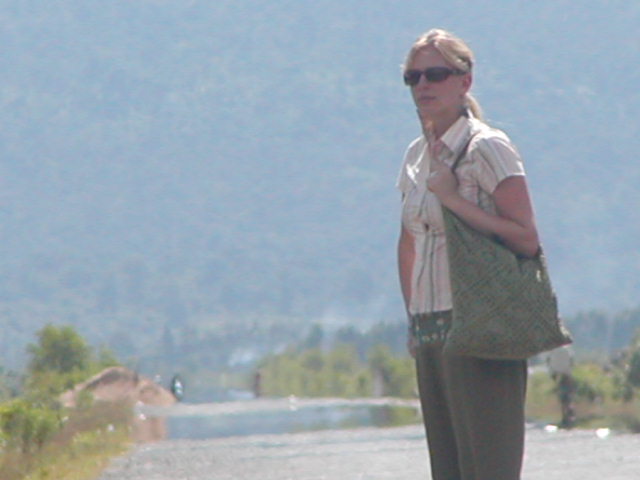Thursday, November 02, 2006
A Child is for Life.....
A Cambodian proverb which means something like "Children today will grow to be the future ". Rea Sai is the word for bamboo, and the proverb refers to small bamboo shoots that will eventually become big strong and versatile. If we nourish the bamboo shoots today, a healthy , strong bamboo will be the futures success.
2 weeks ago a heavily pregnant women waddled in the shelter with two small children at her heels. Her husband crouched on his hunches in the “Asian squat” outside high jagged glass topped walls of the gated the shelter. Srey, an 18 year old victim of trafficking lit up and ran to her mother, and in the usual Cambodian way, shyly greeted her without emotion or fuss (overt acts of affection are almost always reserved for the privacy of the home). Her exhausted mother was quickly provided a chair as Srey fell to her knees wrapping her arms around her mother’s legs and began begging for her to take her home. I sat from a distance overwhelmed by the scene of this innocent girl begging to be taken back by the parents who sold her into prostitution. Half an hour later, her mother, father and two small siblings piled onto their ancient motorbike and headed back to the slums.
The following week, Srey's mother and father both came into the shelter, but this time with 5 children all under 12 scuttling around their feet. Srey greeted them with the same eager anticipation. After about an hour, the shelter manager asked one of the smaller children if they had eaten that day. "No, we are very hungry" they replied, so the shelter staff reluctantly fed the whole family, cursing them for bringing so many of their malnourished children. The newest member of the brood still in the womb will make number 11. Srey and another sibling have already been sold, because there is literaly no money to feed the children. We warn the parents that if they sell their children again they will go to court (which in reality will never happen as there are no social services to take responsibility for the 11 children!). Srey wants to go home, as all the children do irrespective of their situations, but her mum wants her to stay because there is food and education at the shelter, in the slum there is nothing. That day, Srey goes home, she will help her mum with the babies, I wonder if number 11 will be the last.
Everyday I come across too many tragic stories like this affecting millions of children and young people. Over 50% of the population is under the age of 15 and most families live in abject poverty. When the Khmer Rouge decided to remove all education and enforce a peasant lifestyle of extreme hardship and unimaginable violence upon the entire population, I wonder if they thought about the legacy that they would leave behind. 30 years later and Cambodian society is still morally, socially and economically crippled.
Sometimes I used to wonder what good it was for Westerners with no real skills (i.e. doctor, teacher, engineer, economist etc) to come here and volunteer. But now I’ve realised our ability to network and get money, even for small things like a painting class can really make a difference. My friend was a successful marketing professional in Sydney until he came to Cambodia on a holiday. He sat on the beach in Sihanoukville drinking a beer watching 2 young boys crawl under the pool table in the bar where they slept every night. He decided to pay for them to have a room and food so they no longer had to sleep under the table and beg for food. Now those two boys live with over 200 others in a huge shelter set up by this guy for the street kids in Sihanoukville. It turned out his marketing and networking skills managed to secure thousands and thousands of dollars which he has turned into one of the most inspirational and successful NGO’s in Cambodia. His shelter is now entirely sustained by local people, thus will not fall apart once he leaves. Its meeting people like this that make you realise with the right vision, some good contacts and serious drive; you really can make a difference.
Tuesday, September 26, 2006
The Children of Angkor

After franticly sending out emails to friends and family, and in turn their friends and family; I received almost double the amount of donations needed to take the children at my shelter on a three day trip to see the great temples of Angkor. People’s generosity and genuine interest in the lives of a bunch of kids from a far away land stunned me. O.K, so they are not just a “bunch of kids”, I had already told of their courage, their laughter and their tragic stories, and you knew how much they needed a holiday.
People keep asking me “how much did you raise?” Well, as it stands, around $1200 (US), and we only needed $700, and donations are still coming. Exciting plans are already underway for the remainder of the donations and any future funds, including a karaoke party at an orphanage for children with AIDS, and a big jewellery project, details on those to come soon!
While we are on the subject of donations, I must have a small rant…
Due to it's turbulent history, Cambodia is almost entirely economically bolstered by foreign aid and has no real significant industry to call it's own. The number one industry is garment factories, which create a lot of (badly paid) jobs, but are almost all owned by Korean, Japanese and Chinese companies. Tourism is the next booming industry however the extent to which this is exploited by foreign companies is phenomenal. In Siem Reap, which receives over 1mill tourist a year all heading to the temples of Angkor, almost all Korean tourists will go through Korean tour operators, stay in Korean owned hotels, eat in Korean owned restaurants and shop in Korean owned souvenir shops. This is the same for many Japanese, Taiwanese and Chinese guests. They have got a mafia style operation running to cater for tourists who want to see one of the wonders of the world but in the comfort of their world and consequently fail to invest $1 in Cambodia’s economy.
So because Cambodia cannot economically sustain itself; massive first world Non-Government Organisations (NGO’s) and Government Organisations (GO’s) feed Cambodia’s economy.
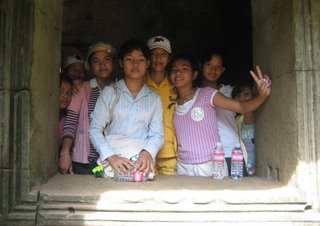 However, they are also riddled with corruption, but a form of corruption deemed entirely acceptable by the international community. Let me illustrate with an example:
However, they are also riddled with corruption, but a form of corruption deemed entirely acceptable by the international community. Let me illustrate with an example:Last week I went to a fascinating meeting held by Save the Children for the launch of a multi-million dollar project to improve Cambodia’s education system. As I sat with around 300 other NGO workers in one of Phnom Penh’s top hotels enjoying a fabulous free buffet dinner (courtesy of STC), 15 KM down the road there were children starving to death in orphanages in the slums that don’t even have enough funds to buy rice. So let me just tell you this: for every dollar, pound, yen, or whatever you donate to Oxfam, Save the Children, UNICEF, Red Cross, Cancer Research etc. the majority goes on “overheads” and “expenses”, i.e. dinners in 5 star hotels, shiny American 4x4 land cruisers and enormous wage packets. I can guarantee that every $1 you donate to me goes directly to the people.
Just one question then:
‘How the f#@k do I cancel the 2 pounds standing order that floats out of my bank account and into Oxfam’s marketing campaign every month?’
Yes, that could provide schooling for a child for a whole year…if I bi-passed the whole organisation and gave it directly to the child!
Now on to the real reason why we are here: Siem Reap.
I jumped on the bus in Phnom Penh to be greeted by 16 eager faces:
“Goood moooorning Antonia, How are youuuu?”
They were unbelievably excited and as soon as the bus started moving the singing broke out, a bea
 utiful Khmer song about Siem Reap and the temples of Angkor. I don’t think any of the children slept the entire 5 hour journey, they were just too excited. We arrived at the guesthouse and god help me, each room had a T.V so on went the Karaoke channels, but at east I got to hear more of the children’s beautiful voices. All the children received disposable camera’s since they love photos of themselves, which they went crazy over. Trying to get them to save pictures for the following day at the temples was a serious challenge, but it was so sweet to see the different ways they treated this gift. One of the two boys was so meticulous; he lined up the shots carefully and used the film sparingly, while most of the teenage girls snapped away like crazy, posing in every possible way in front of any background.
utiful Khmer song about Siem Reap and the temples of Angkor. I don’t think any of the children slept the entire 5 hour journey, they were just too excited. We arrived at the guesthouse and god help me, each room had a T.V so on went the Karaoke channels, but at east I got to hear more of the children’s beautiful voices. All the children received disposable camera’s since they love photos of themselves, which they went crazy over. Trying to get them to save pictures for the following day at the temples was a serious challenge, but it was so sweet to see the different ways they treated this gift. One of the two boys was so meticulous; he lined up the shots carefully and used the film sparingly, while most of the teenage girls snapped away like crazy, posing in every possible way in front of any background.September 19th
It’s 5am, my birthday and everyone is up, showering, karaoke T.V on, grooming, laughing, chatting, I groan and manage to lounge in bed until 6.30. By the time I had got out the shower, everything is in silence,
“Where is everybody?”
I drag myself down the stairs to find them all on the bus, patiently waiting for me, and then the singing started up again, now I’m smiling inside and out. Finally arriving at the temple ruins with 16 Cambodian kids who had only seen these images in pictures and on T.V was truly remarkable, something I will never forget. The children were an absolute
 dream, not once for the entire day did I walk without a child holding each of my hands or wrapping their arms around my waist. We climbed 30 metres up vertical stairs to the top of Angkor Wat and marvelled at the stunning views of endless temple ruins, lakes and huge old trees. We had races from temple gates to stone statues, we played hide and seek amongst the maze of tunnels, pillars and stairs of Angkor Thom. The kids practiced their Japanese on the tourists who were loving the opportunity to photograph "authentic Cambodian children", only too happy to play up to the lens. Not once did I hear anyone moan, cry, argue, bicker the whole trip, if fact come to think of it the whole time I have known them. Can you imagine the behaviour of children and teenagers who have gone through similar traumas in the UK or US?
dream, not once for the entire day did I walk without a child holding each of my hands or wrapping their arms around my waist. We climbed 30 metres up vertical stairs to the top of Angkor Wat and marvelled at the stunning views of endless temple ruins, lakes and huge old trees. We had races from temple gates to stone statues, we played hide and seek amongst the maze of tunnels, pillars and stairs of Angkor Thom. The kids practiced their Japanese on the tourists who were loving the opportunity to photograph "authentic Cambodian children", only too happy to play up to the lens. Not once did I hear anyone moan, cry, argue, bicker the whole trip, if fact come to think of it the whole time I have known them. Can you imagine the behaviour of children and teenagers who have gone through similar traumas in the UK or US?We had a picnic lunch in a deserted, peaceful spot next to the huge moat that surrounds Angkor Wat. Using our fingers, we hungrily tucked into a feast of rice, fried fish, chicken and eel, in the true Cambodian way: making as much noise and mess as possible. Bones were sucked, crunched and spat, and fish heads were excavated, no part of the animal ever goes to waste in Cambodia (a facet of their culture I can never bring myself to embrace, once again I blame it on the vegetarian upbringing!). After the meal was finished, the kids collected up all the plastic trays, cups, tissues and plastic bags and just as I’m admiring the beautifully clean surroundings; they attempt to throw the whole lot in the bush.
“No, no, no!” I shout
“This is Angkor Wat, look…” I’m franticly pointing at my eyes and then at the ground
“Look, beautiful, clean, no plastic”
They look a little stun
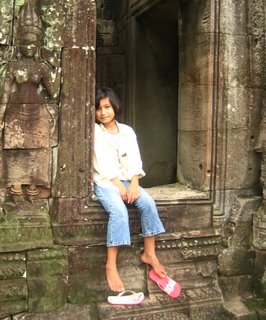 ned, laugh nervously and put the rubbish back with the rest of our belongings. Two girls wander off, chatting, drinking cups of coke. One throws her cup into the moat (one of the only clean bodies of water I have ever seen in Cambodia), and the other throws hers on the ground. I run after them and pick the cup up from the floor and hand it back, I’m struggling to keep my patience. I ask one of the teachers to translate; I need to teach them about waste management, she laughs:
ned, laugh nervously and put the rubbish back with the rest of our belongings. Two girls wander off, chatting, drinking cups of coke. One throws her cup into the moat (one of the only clean bodies of water I have ever seen in Cambodia), and the other throws hers on the ground. I run after them and pick the cup up from the floor and hand it back, I’m struggling to keep my patience. I ask one of the teachers to translate; I need to teach them about waste management, she laughs:“I know, I know, not in Angkor Wat” she says
I’m incredulous
“No not in Cambodia! This plastic will be here long after the temple ruins have all gone. You can’t just dump rubbish all over your country”.
For me, living amongst mounds of rubbish everywhere you go, is one of the harsh realities of Cambodian life.
We are both lost.
How can I promote my first world ideals about waste management to a country that has practically no infrastructure or education to address these problems? And how can they understand the concept of deferred gratification; that their health and their environment will be protected in the future if they change their behaviour now. It’s in these situations that I really have to step back, close my eyes and try to imagine life from their perspective. Of course I cannot comprehend their lives, but I quickly realise I cannot be angry with kids who are simply mimicking behaviour taught to them by the rest of their society. There are so many massive problems to overcome in this country, what might be big to a privileged westerner could be at the very bottom of the list for the locals. All these things will come eventually through development, always step by step.
That evening we celebrated my birthday in the guesthouse with dinner, games and a huge chocolate cake. Then one of the most humbling things of my life happened to me. The kids had used pa
 rt of the $1 spending money that Turbo had donated to each child, and spent it on gifts for my birthday. I was absolutely dripping in necklaces, earrings, rings and bracelets. Inside I was crying, while outside I was smiling and just drinking up their warmth and love. As much as life in Cambodia can be challenging, frustrating and sometimes depressing, nothing I have ever done has been as rewarding as receiving those gifts and hearing them chime:
rt of the $1 spending money that Turbo had donated to each child, and spent it on gifts for my birthday. I was absolutely dripping in necklaces, earrings, rings and bracelets. Inside I was crying, while outside I was smiling and just drinking up their warmth and love. As much as life in Cambodia can be challenging, frustrating and sometimes depressing, nothing I have ever done has been as rewarding as receiving those gifts and hearing them chime:“We love youuuu, we are happy”.
These children are my Cambodia.
To everyone who donated and made this trip happen, I whole heartedly thank you, I will never forget, and I’m sure the children will never forget the day they got to see the most important legacy of their people.
Monday, August 28, 2006
A city of a thousand tales...

The Cambodian’s have certainly got one thing right: selling a country is like selling a house, first impressions count for everything. Since tourism is now the number one economy booster, they make sure their valued foreign guests are greeted in style. The airport is positively gleaming, highly polished tiles, soft music and amazingly efficient baggage handlers that make Heathrow look like a scummy bus station in Rotherham.
Jumping into a tuk-tuk and making the journey into the city reveals a different story as dusty, grimy streets hopping with activity lay this fascinating nation bare. Phnom Penh is a city of contradiction
 s. Where muddy dirt tracks; strewn with garbage and littered with noodle stalls lead to vast 4 lane boulevards lined with blossoming trees and huge colonial mansions. Where a family of 6 cling on to a clapped out motorbike, struggling to maintain balance as a boisterous American 4x4 land cruiser whooshes by. Where a Buddhist monk; clad in sunset orange robes glides serenely down the riverside, passing grubby little street kids hustling the tourists for a buck.
s. Where muddy dirt tracks; strewn with garbage and littered with noodle stalls lead to vast 4 lane boulevards lined with blossoming trees and huge colonial mansions. Where a family of 6 cling on to a clapped out motorbike, struggling to maintain balance as a boisterous American 4x4 land cruiser whooshes by. Where a Buddhist monk; clad in sunset orange robes glides serenely down the riverside, passing grubby little street kids hustling the tourists for a buck.Phnom Penh was exactly as I left it 8 months ago if not a little cooler and a lot rainier. But I had chosen not to remember the development, the symbols of the West ever present, from the $ bills that fill my purse, to the impressive shopping mall complete with balsamic vinegar and marmite selling supermarket. I don’t know why I chose only to remember the poverty, but the stunning colonial architecture and of course the marmite were a welcomed addition. This capital city is both charming and endearing and the lack of public transport systems, sky scrapers, Starbucks and McDonalds (can you believe it?!) make it feel like a small village with a big attitude. On first impressions, Turbo describes it as rural Thailand 19 years ago, if that’s true, this city has got a long way to go before it reaches Bangkok standards.
I live in a $2 guesthouse by a large lake in backpacker’ ville (re-named rat-packer’ ville, after the fury friend I found in my room last night). It’s actually OK, not too dirty, although after a month of hearing the same backpacker stories about all the places I have already been, I’m ready to get myself a gated apartment complete with guard and iron window bars in the city. Actually P.P is not that dangerous, the gun crime has reduced a lot and as long as your not stupid and walk down dark streets at night, most areas are ok
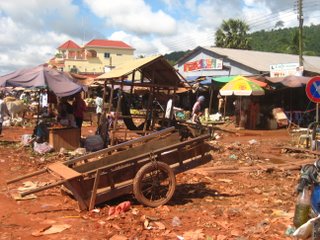 . I haven’t been near any of the slums but my friend who is a volunteer doctor went to visit HIV patients in a big slum area and his stories are horrific. In the governement hospitals, each morning the surgeon team will have more then 50 patients in dire need of treatment, but only 4 people will get seen that day. They do a lottery every morning (i'm not joking) to choose the lucky patient's and the rest will be sent home, many almost certain to a fate of death. Some may have saved up for 6 months to get the money to take a motorbike taxi to Phnom Penh from the provinces, in which time their illness will have got out of control. They will then be sent home untreated. I think we should all stop complaining about the NHS?
. I haven’t been near any of the slums but my friend who is a volunteer doctor went to visit HIV patients in a big slum area and his stories are horrific. In the governement hospitals, each morning the surgeon team will have more then 50 patients in dire need of treatment, but only 4 people will get seen that day. They do a lottery every morning (i'm not joking) to choose the lucky patient's and the rest will be sent home, many almost certain to a fate of death. Some may have saved up for 6 months to get the money to take a motorbike taxi to Phnom Penh from the provinces, in which time their illness will have got out of control. They will then be sent home untreated. I think we should all stop complaining about the NHS?My business will not take me to the slums, and it is absolutely unavoidable everywhere you go in this city: prostitution. As Cambodia experiences massive surge in tourism, Phnom Penh now lies at the heart of sex tourist trade in S.E Asia and most worrying paedophile tourism. But there are many misconceptions about the proliferation of children trafficking and paedophilic behaviour. Child sex tourism remains a very small, hidden market, yet thousands of pre-pubescent girls are trafficked from their villages to the city every year in an extremely lucrative market.
So who is having sex with these young girls?

Prostitution is embedded into most Asian societies, and here in Cambodia, the old tradition of polygamy is kept alive by frequenting the brothels. From what I can gather, the concept of paedophilia just does not exist in the way it does in the West. Yes of course sleeping with small children is certainly considered wrong, but for the 14, 15, 16 year old girls from the villages, they give old men vitality and are considered clean and disease free. In a city where 37% of commercial sex workers are HIV+ (compared to 2% of the total population) the tragic irony is that as HIV prevention increases, the demand for younger and younger girls has ballooned. With a nation of condom haters, these young girls are considered clean, yet the very fact that their bodies are not ready for sex with grown men makes them even more susceptible to contracting fatal STD’s.
I’m working for a local NGO just out of the city that rescues children from commercial sexual exploitation and severe sexual abuse. I work at the head quarters in P.P which is also a shelter for around 24 children, mostly girls aged between 12 and 18. Most have been rescued from brothels where they were locked into “dept bondage” (they must work off the cost of their own purchase) often for up to 2 years. We provide food, lodgings, education, vocational training and trauma counselling for a temporary period (around 6 months) until they can be safely reintegrated back into their communities or provide
 d jobs in garment factories or a place in a more permanent shelter. And this is my biggest worry.
d jobs in garment factories or a place in a more permanent shelter. And this is my biggest worry. What happens to them when they leave?
Most families will tell the authorities that they were tricked into selling their daughter, believing they were going to be domestic servants. But sadly, it is common knowledge that in rural communities where families do not have enough food to feed their children, the sale
 of one daughter (average $150 US depending on how beautiful they are) and the promise of regular income is a sacrifice that is too frequently made. So the reintegration of these girls back into the communities that sold them in the first place is not only distressing but can be extremely dangerous. Trafficking rings are run by Mafioso style groups and often supported by the police and corrupt government officials, so if a girl is rescued before she has paid off her dept; the family will be in great danger and may have to go into hiding. Last year around 100 underage girls were rescued in a huge brothel raid by NGO’s and the UN and placed in shelters all round the city. We got about 50, double our capacity and within 2 days the police and authorities had stolen all the girls back and returned them to the brothels. One of the biggest challenges for trafficking NGO’s is trying to get the police and authorities on their side. It’s not all this corrupt and many of our girls come through the authorities but there are still too many examples of bad practices.
of one daughter (average $150 US depending on how beautiful they are) and the promise of regular income is a sacrifice that is too frequently made. So the reintegration of these girls back into the communities that sold them in the first place is not only distressing but can be extremely dangerous. Trafficking rings are run by Mafioso style groups and often supported by the police and corrupt government officials, so if a girl is rescued before she has paid off her dept; the family will be in great danger and may have to go into hiding. Last year around 100 underage girls were rescued in a huge brothel raid by NGO’s and the UN and placed in shelters all round the city. We got about 50, double our capacity and within 2 days the police and authorities had stolen all the girls back and returned them to the brothels. One of the biggest challenges for trafficking NGO’s is trying to get the police and authorities on their side. It’s not all this corrupt and many of our girls come through the authorities but there are still too many examples of bad practices.As if things couldn’t get worse, there is a massive stigma attached to girls who have lost their virginity before marriage, even if they have been raped. There is a great risk of the girl being shunned by her community and deemed eternally unfit for marriage. And for a nation where women’s rights are at the very bottom of the agenda, marriage is essential for all women’s survival.
Do I feel like I’m involved in a hopeless situation?
Absolutely not. There is so much potential for change and development in Cambodia particularly for women’s rights. Yes, there is a mammoth task ahead, of which corruption and ineffective leadership is creating a huge barrier, but there are also some very good people dedicating their lives to change. Under 30 years ago this country lost ¼ of its population to one of the bloodiest genocides in history, and to this day you will not meet one pers
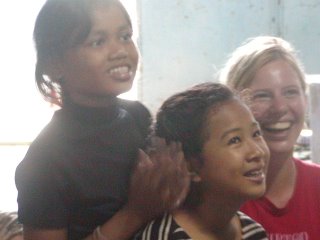 on that wasn’t directly affected by the war. Some say this has created a population that live only for the moment, because they have lost faith in the future. But I have been overwhelmed by the courage and strength of the people I come across, and the warmth they have shown me. The girls I work with have been through the most horrific trauma, yet they battle through daily life with determination and dignity. They support each other and dedicate themselves to learning life skills and education because they know they have to do everything they can to relieve themselves from this situation.
on that wasn’t directly affected by the war. Some say this has created a population that live only for the moment, because they have lost faith in the future. But I have been overwhelmed by the courage and strength of the people I come across, and the warmth they have shown me. The girls I work with have been through the most horrific trauma, yet they battle through daily life with determination and dignity. They support each other and dedicate themselves to learning life skills and education because they know they have to do everything they can to relieve themselves from this situation.When I first arrived, I wondered why the children never got cuddles when they cried, but now I’m beginning to understand. They are no longer children, they don’t have any toys, and I rarely see them play. We have to teach them as much, and as fast as we possibly can to enable them to survive in the harsh world they live. Crying will not help them, they have to be strong. Right now I can hear laughter, and as the girls sit in the classroom, they can learn in a calm and safe environment. Yes it’s temporary, but they now know that they are not completely alone in a hopeless situation. They can see that people do care, and believe they are worth more then their beautiful face. I hope they carry this knowledge with them before they loose all faith in humanity.
Life in post conflict developing societies is harsh. But life for women in post conflict developing societies can be impossible. Women are the protectors of children, and their well-being is fundamental to the development of this country. It isn’t a hopeless situation, and I feel truly blessed for the opportunity to be involved in lives of 24 children that have captured a piece of my heart.
Thursday, August 03, 2006
From a cultural Desert to Cultural Carnival

Anyway.....On to a place where traditional cultural heritage is celebrated almost continually. Where a vast rainbow of colour, and an orchestra of sounds bombard all of your senses. This is Bali, the land of smiles, the land where beauty is embraced and celebrated over every crevice of her surface.
If it hadn't happened, I wouldn't have believed it myself. Stepping through customs and into the arrival gate, POW, it slapped me right in the face, knocking me off balance: Culture Shock. I didn't think this was possible after already speeding 3 months in Asia, but I guess that was part of the problem. "Holidaying" in Australia and NZ for too long had made me an over-confident and arrogant traveler, and I didn't in any way prepare myself for the onslaught.
"Taxi, Taxi",
"Where you going miss",
"Transport, Transport",
"How much you wanna pay?"
"I don't know, what the hell is this currency anyway? 8,700 to the dollar, too many 0's I'm confused, it's too hot, ahhhh, where the airport bus, what do you mean there's no tourist info! I need two minutes to think, please stop shouting at me!"
Ok, call Turbo, get coins for payphone.....Water, I need water, 4000Rp, was that a rip-off? Shit, how does the payphone work?
Ok, no payphone, I'll take a taxi half way then change to the local bus and save half the money. Why is it that after 7 months of paying exorbitant western prices, the second I land in a place where everything is cheap I start cutting corners?
Within my first hour, I had learned a new concept: Bali time. As I sat on a Bemo (local bus) for over an hour waiting for enough people to warrant the journey, I finally gave up and moved to the busy street to wait for another hour for a bus going in my direction. Finally I found one and after paying 10x the local rate (by then I would have paid 20x), we slowly trundled up the road picking up and dropping off what felt like every other person in B
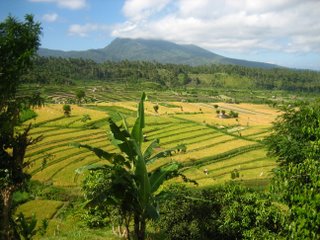 ali.
ali. The road to Ubud was literally lined with carving shops making and selling every imaginable item out of wood, many of which will eventually make it's way to our bedrooms and living rooms. Ubud is nestled amongst stunning rice terraces which mould themselves around the landscape, illustrating the contours of the hills. Everywhere you look you see beautiful things from huge grand stone carving in the middle of round-abouts, to stunning houses and temples all with thatched roofs. Women walk around the streets carrying great big trays filled with fresh flowers and incense which they use to make offerings to the gods. Everywhere you go beautiful white, yellow and bright red flowers litter the pavements, house entrances, car windscreens, shrines and anything else that needs blessing!
After finally contacting Turbo, a friend I met in Chiang Mai 9 months ago; the sight of his gentle face and blindingly bright clothes instantly lifted my spirits. I couldn't bring myself to tell him the depths of the bumbling mess I had made out of my first 3 hours back in Asia... Well now you know! Fortunately the culture shock evaporated almost as fast as it appeared and I was once again awed by Asia's quirky beauty.
My visit to Bali came at the perfect time in my life and as it happens also my Dad's. After one e mail from me protesting that he should dump his holiday plans in Scotland and come to Bali, he booked his ticket and was by my side in under a week. Talk about spontaneity, it was so wonderful to see him after almost a year. As I was contemplating my dream of returning to C
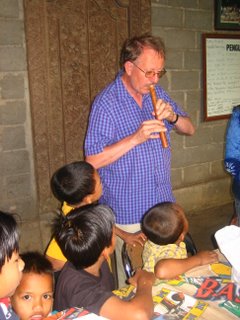 ambodia to work with victims of human trafficking, I found myself surrounded by people all doing amazing work to help others. On the first day that my Dad arrived from England, Robyn from Australia took us to an orphanage that she visits regularly.On the way Robyn bought huge sacks of rice, noodles, fruit and other things needed by the children and also a whole selection of musical instruments for Dad's "percussion workshop". I couldn't help but be moved by the generosity and compassion that she showed these children who had obviously captured a little piece of her heart. Most of the children here are "economic orphans" which essencially means they do have a family but for economic reasons they cannot live at home. Many however, have no family at all. It comes as a surprise to many tourists that such poverty exists in Bali, but much of it is hidden poverty. I couldn't help but wonder what the future would hold for these children but for the 3 hours we spent making the most ridiculous racket with the instruments, their smiles and laughter melted our hearts and warmed our day. Who said charity was selfless?!
ambodia to work with victims of human trafficking, I found myself surrounded by people all doing amazing work to help others. On the first day that my Dad arrived from England, Robyn from Australia took us to an orphanage that she visits regularly.On the way Robyn bought huge sacks of rice, noodles, fruit and other things needed by the children and also a whole selection of musical instruments for Dad's "percussion workshop". I couldn't help but be moved by the generosity and compassion that she showed these children who had obviously captured a little piece of her heart. Most of the children here are "economic orphans" which essencially means they do have a family but for economic reasons they cannot live at home. Many however, have no family at all. It comes as a surprise to many tourists that such poverty exists in Bali, but much of it is hidden poverty. I couldn't help but wonder what the future would hold for these children but for the 3 hours we spent making the most ridiculous racket with the instruments, their smiles and laughter melted our hearts and warmed our day. Who said charity was selfless?! Since the bombings in Kuta, tourism in Bali dropped by around 90%. For a country who's economy is driven by tourism, this has had catastrophic effect on the local population. It's both shocking and depressing riding around Ubud in the evening and seeing all the restaurants empty bar one table that the bored looking staff occupy. However, I think they are having a pretty good season now by all accounts.
One morning in May, the earth creaked, shuddered and groaned waking up Java's Jogjakarta region to the shock of their lives.Before the aid even reached the area, pictures of the mass destruction caused by the earths latest protest in Java filled our livingrooms and just as rapidly disappeared from our screens and conscience. As the world moved to the next disaster, the plight of the 5000 killed and hundreds of thousands injured and displaced gripped Turbo too tightly and his only release was to take the short flight to his neighboring island and see what he could do. Just a few days after the quake, Turbo rocks up to a village where no aid other had reached, to be confronted by mass panic as people rushed around trying to make sense of the unrecognisable world that now surrounded them. It takes a seriously courageous and equally stupid foreigner to arrive in a rural village in a state of absolute carnage and roll his sleeves up and get working. In a month Turbo became a disater relief expert, project manager, event's coordinator, child entertainer, psychotherapist, fundraiser, accounts manager, population statistician and an all round celebrity. I cannot do this story justice, but please read the amazing blog written by one of his local volunteers about what happened when a Japanese Samari showed up in town!
entertainer, psychotherapist, fundraiser, accounts manager, population statistician and an all round celebrity. I cannot do this story justice, but please read the amazing blog written by one of his local volunteers about what happened when a Japanese Samari showed up in town!
http://artgralife.blogs.friendster.com
I don't think Turbo really has any comprehension of the enormity of what he did for these people who lost everything. All I can do is stand back in awe and wonder what the world would be like if everyone had the courage and vision to look outside of their little bubbles and realise the world needs them.
As I sat around the table in Flava lounge surrounded by all my new friends and my ever supporting and loving father, I felt like a battery that had just been re-charged. The lessons I had learnt and the strength I had received over the last month had filled me with the happy/nervous feeling I always get at the start of a new adventure. Bali had changed me and there was no going back, I knew where I was going and why I was going....
To the magnificent Kingdom of Cambodia........
Thursday, June 29, 2006
Last tales from Down Under...
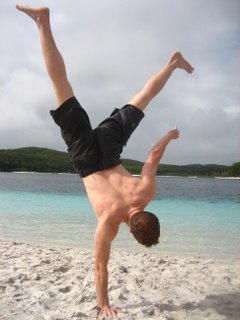
It's been a mindblowing last month in Northern Australia and as it's now time to leave i'll share a few pictures and words with you....
I think most of you pommies will recognise this acrobat...yes it's Emil upside down (as usual) or is he the right way up since Oz is upside down anyway? Oooh far too confusing for this blonde.
We spent a fabulous couple of weeks in a camper van traveling the East coast (which is sooooo over rated by the way). Here he is at Lake McKenzie on Fraser Island.
 Bloddy hell, the North of Oz is absolutely teaming with these deadly beasts. You can't swim anywhere without the threat of having your legs snapped off .You can however, do fantastic boat trips and get dangerously close to these amazing crocodiles in the wild. Some that we saw were up to 5 meters long!
Bloddy hell, the North of Oz is absolutely teaming with these deadly beasts. You can't swim anywhere without the threat of having your legs snapped off .You can however, do fantastic boat trips and get dangerously close to these amazing crocodiles in the wild. Some that we saw were up to 5 meters long!We met this one just outside Darwin but saw others in Cape Tribulation, North Queensland.
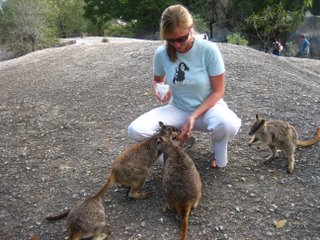
Now these are far more friendly...
Rock Wallabies at granite Gorge, Queensland where I spent a couple of weeks traveling with my mum.

Giant termite mounds, Kakadu National Park, Northern Territory.
Termite mounds litter the landscape in the outback. In fact there are more termites then any thing else in Australia. A termite is about the size of an ant so you can imagine it takes billions to mix their saliva with dirt to make these colossal nests. This one took about 60 years to make and is still growing today.
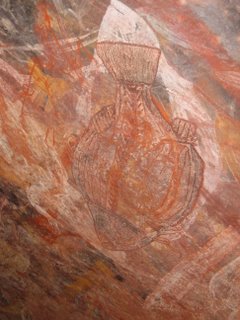
Aboriginal rock art in Kakadu National park has been estimated at between 10,000 to 50,000 years old, making it some of the oldest art in the world. These predictions are based on geologists research of the rock and also in the drawings themselves which feature extinct animals. The art features a range of images most depicting sources of food such as this fish, snake, and kangaroo. It was believed that by celebrating hunting achievements in this way it would make food (which was often scarce) more abundant. More scared art depicting "dreamtime" or spiritual links to ancestors is not allowed to be viewed by the public for cultural reasons. You can imagine, that with no written history these artifacts are of immense importance to indigenous Authralians. The 22,000 square K's of Kakadu is 60% indigenous owned and the rest remains in land disputes. Tourists only have access of about 1% of the park, but it is known that the rocks throughout this vast space are covered in art. It is believed that the Aboriginals worked as hunter gatherers for only about 4 hours per day so there were long periods of time when they had little to do. Art was as much a leisure activity as it was a means of communication and teaching.

The natural beauty of Kakadu is unmatched in all of Australia in my opinion. This is just one of the amazing waterfalls we swam in (crocodile free thankfully!). The water was so pure and fresh, especially after hiking in 30 degrees.
Saturday, May 13, 2006
I'm drowning down here!

Water, water and more water....liquid, solid and gas, I've had it all and I've just about had enough, but it certainly has it's ups. Mix all this H2O with a huge dollop of extreme sports and you get a typical month in the life of a NZ backpacker.
Glacier Hiking
I last left you all the way in Franz Joseph where I was to experience the joys...and dangers of hiking on the solid variety. After a few words the previous night with a dear friend back in the UK, Rosie, I was left wondering just how "full on" this experience was going
 to be. Having done the glacier hike a few years ago, it was still fresh in her mind as one of the most amazing experiences she had had in NZ.
to be. Having done the glacier hike a few years ago, it was still fresh in her mind as one of the most amazing experiences she had had in NZ. Waking up in the morning to the familiar sounds of the rain, it was clear that today we were going to get cold and wet! Loaded with sandwiches and chocolate, we were kitted out from head to toe in waterproof gear which was to prove utterly useless in about half an hour. The most interesting part of the kit was our "talons" : metal spikes that when attached to your boots make one immune to even the wettest of ice.
Still buzzing from my morning capuccino I've got a spring in my step, and I'm ready to take on this ever dripping expanse  of frozen water in all it's magnificent glory. Due to the glaciers natural constant re-shaping, our guide Nicki (who is about my height and half my size), spends the day paving our way, creating steps using a huge pick axe with all the power of an All Blacks rugby player. Boys, you would have been utterly shown up! As we jump over crevices wide and deep enough to swallow even the fattest American tourist, im suddenly having flash backs of broken legs and hospitals in Vancouver. Do you think this activity is on the list of my insurance policy?
of frozen water in all it's magnificent glory. Due to the glaciers natural constant re-shaping, our guide Nicki (who is about my height and half my size), spends the day paving our way, creating steps using a huge pick axe with all the power of an All Blacks rugby player. Boys, you would have been utterly shown up! As we jump over crevices wide and deep enough to swallow even the fattest American tourist, im suddenly having flash backs of broken legs and hospitals in Vancouver. Do you think this activity is on the list of my insurance policy?
Seven hours later after crawing through ice caves and doging chunks of falling ice, I'm back on solid ground again. Needless to say, minus the spring as my tired, aching legs and shivering body heaves itself back onto the bus to town. Yes Rosie, you were right, "full on" is a great description, and I agree, what an exhilarating experience and certainly up there on the danger scale. Oh we love kiwi's for their lack of a liability culture, but I was to sign my life away a few more times yet....
Queen of the sea's
Were now right in the North of the South Island, Marlborough Sounds, a beautiful place with seemingly endless inlets and bays, impossible to explore by land. Lucky that one of our party is an experienced sailor, and in the good ol' kiwi fashion we 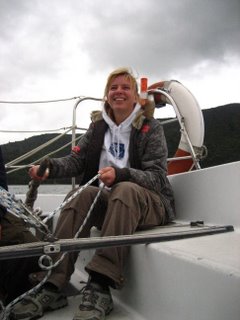 are given control of a large sailing boat without any question of out ability to maneuver the thing, "sweet as"!
are given control of a large sailing boat without any question of out ability to maneuver the thing, "sweet as"!
The day was going swimmingly, as you can see I was giving Ellen MacArthur a run for her money as I single handedly circumnavigated...urrm, well, not quite the world! Things were really looking up when Thom reeled in a huge blue mackerel for the hungry brood, however someone was not happy. The fish gods were out for revenge and almost instantaneously the heavens opened, and well, didn't close... actually still haven't closed. As sheets of icy rain slapped my face raw, sails firmly down, motor on, we were on a mission. Dreams of roaring fires and cold pints fuelled our determination to reach "dry" land. However, these were rapidly washed away as the reality of mooring at a jetty in low tide with no dingy proved to be a fruitless task. Unless we were going to swim to the pub the beer was staying firmly in the barrel.
Two hours later we finally find a pub with a jetty deep enough for us to moore, and ahhhh a huge log fire. Our "fun" was only just beginning as this glorious vessel was to double up as our bed for the night. Four merry little sailors reluctantly emerge from the the watering hole only to be once again drenched all the way to the boat. Once inside, cozy is not the word i'd use to describe this misery. Scrunched up on a makeshift bed smaller then the average double, our warming bodies mixed with our drenched clothes created a chocking, humid hell hole. The insomnia refused to subside as relentless rain and howling wind battered against the jetty THE ENTIRE NIGHT!
"Tramping" at Mt Doom
Safely across the Tasman sea and into the North Island, it was time to enter LOTR territory in Tongariro. One of the most popular and apparently stunning tramps (which, by the way this is not the sport of drinking cider on park benches, it's NZ speak for hiking) is the infamous Tongariro crossing which takes you up active volcano's, across craters and past stunning volcanic lakes. Now I know you can see where this is going....
Yes it's 6am and heavy fog and drizzle tells me were not going to see too much today. By 8am were on the track and already resembaling drowned rats. There is apparently a volcano in the distance but I sure as hell saw absolutely no evidence of it. 50mins into the hike and two winging Phoms who's self confessed favorite activities are drinking and smoking are already claiming
"I can't climb a mountain"
"I'm cold and wet"
Well we all bloody are, but there's no point complaining every minute. I suddenly f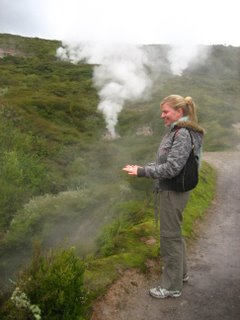 eel pangs of guilt about all those times I infuriated my parents with my protests at being dragged up hills in the Peaks as a child.
eel pangs of guilt about all those times I infuriated my parents with my protests at being dragged up hills in the Peaks as a child.
After I'd shaken off the lagers, I had an amazing time soaking up the bizzar atmosphere of this amazing landscape. The earth was utterly alive as hot stream hissed out of holes in the ground and pungent smells of sulfur filled my nose. Never have I been anywhere so absolutely bursting with energy, while totally arid on the surface. Walking across a huge plateau indented with massive craters, I felt like I was on another planet. I had a great day, despite being literally in a cloud for the majority of it!
Picture not taken on the crossing as you literally could see nothing!
After being totally pampered by my wonderful friends, Francis, Renee and Laurens parents in Napier for 3 days, it was time to get back into backpackerland....
More Extreme Adventures
This is getting rather long so I'll save you the details of the rest of my kiwi adventures, but let's just say, there in nothing comparable to jumping out of a plane at 12,000 ft. I actually can't even cunger up any words to descibe the feeling of pure adrenalin as you are plunged to the earth for 45 seconds of freefall.
I think this is how the story must have gone...
Once up on a time, some bored farmer boys sat in the kitchen drinking a beer, mesmorised by the swirling clothes in the washing machine.
on a time, some bored farmer boys sat in the kitchen drinking a beer, mesmorised by the swirling clothes in the washing machine.
"what do you think it feels like to be in a washing machine?" One said to the other.
"Sweet as I reckon, lets try it"
And just like that, the sport of Zorbing was invented. Simple, quirky and hilariously funny, you (and a couple of mates) are swallowed into the core of a huge inflatable ball filled with warm water. On the count of three you push the thing down a huge hill and slosh around in fits of laughter trying to avoid the multiple limbs threatening to take out your gnashers. Oh you kiwi's have done it again!
A sad day as I have to say bye to my dear friend Ian whom I've been traveling on and off with sinse Thailand. Out with a bang though as we absailed, tubed and rockclimbed in the amazing Waitomo caves. With the high water level from all that rain, I was almost a goner as the strong current dragged me into the dark bowels of the cave. However, the even stronger instructor rescued me (much to my delight) and another fantastic day had in a country with seemingly endless opportunities to dice with death.
Ahhhh now back to the civilization of Aukland. My heart rate has leveled and guess what.....? it's raining, but the internet is cheap!
Saturday, April 22, 2006
Finally I found Paradise....

"Oh my god I can't believe it, I've never been this far away from home..." Kaiser Chiefs
This is what song was swirling through my head as I flew over the stunning mountains of NZ's South Island before setting down amongst the Canterbury Plains in Christchurch. Another country but that same butterfly feeling as I anticipate a new adventure into the unknown. After all that I have heard about NZ I cannot really call it the "unknown" however nothing could have prepared me for this. This country has absolutely amazed me and I can finally answer the question that has been asked of me so many times, about "which is my favorite country so far".
The biggest shock for me so far is the sheer destitution. I know all the stats about a total population for 4mill but I had no idea that there would be absolutely no sign of human habitation for as far as the eye in so many places. I mean, I'm a European, this doesn't happen where I come from! From Thailand where we were conned into taking bus tours to the crappyest little waterfalls, to a land absolutely bursting with waterfalls, gorges, glaciers, lakes, crashing ocean, thermal springs And more.
As I walked along the lake in Wanaka yesterday listening to music and trying to take it all in, I suddenly realised that this is paradise. As much as the stunning beaches of Thailand, the dramatic Mekong in Laos and the Temples of Angkor in Cambodia impressed me, this paradise is multi-faceted. The sheer variety of n
 atural beauty is in no way compromised by the people who inhabit it. New Zealanders love their country and it shows so much in the lengths they have gone to preserve this beautiful land. Most of the rest of the world has got so much to learn about the way we treat our lands and unfortunately most of that damage is irreversible. NZ represents the absolute antithesis of Vietnam where humans have made their mark, often carelessly on every inch of land. The few roads that do cut through the landscape here, are discretely one or two lane no matter how 'major' they are supposed to be. Recycling is not suggested, it is enforced and organic farming is becoming mainstream.
atural beauty is in no way compromised by the people who inhabit it. New Zealanders love their country and it shows so much in the lengths they have gone to preserve this beautiful land. Most of the rest of the world has got so much to learn about the way we treat our lands and unfortunately most of that damage is irreversible. NZ represents the absolute antithesis of Vietnam where humans have made their mark, often carelessly on every inch of land. The few roads that do cut through the landscape here, are discretely one or two lane no matter how 'major' they are supposed to be. Recycling is not suggested, it is enforced and organic farming is becoming mainstream. I already knew what to expect of New Zealanders after my crash course with Francis, Lauren and Renee in Melbourne, but I'm still surprised how in every shop you go into they have a full blown conversation with you no matter how big the queue. Everything about this place and it's people are "low key" and things are "sweet as"! You couldn't get as friendlier bunch!
I've been lapping up the new space I've found to think and breath in fresh air. A couple of days ago I did a 6 hour hike up to the top of a mountain in Queestown, my first in a long time and my calves are still burning! But the panoramic view at the top provided the most amazing reward, just as I was about to die. I resisted the temptation to throw myself from any platforms with elastic around my ankles in the adenalin crazed Queesntown and headed for the quieter town of Wanaka. Sitting in the valley between the Cadrona and Trebble Cone ski fields, this town is filled with snowboarder types, even out of season. Unfortunately the snow hasn't started falling yet but still there was loads to do.

I've just arrived in Franz Joseph famed for it's glaciers. Tomorrow I will be kitted out with special shoes and go hiking actually on the ice, something I've always wanted to do. I'll post some photos soon....
Tuesday, March 28, 2006
Motorcycle diaries Vietnam style!

From tranquillity to insanity
Let me start this story of my epic journey through Vietnam’s central highlands with a little background of my whereabouts at the time. I was travelling Vietnam North to South; starting in the loudest, fastest and most buzzing city I had ever had the pleasure of plonking myself right smack in the middle of; the capital: Hanoi. Travelling on the well trodden South East Asia full circle loop starting and ending in Bangkok, I had just left behind one of the most under-populated and chilled out countries I have ever been to: Laos. With a total population of around 6 million, you can understand my shock at leaving Laos and finding myself (after a luxurious one hour flight), in a country geographically similar in size but with a whopping 80 million inhabitants.
After two glorious weeks of indulging myself in the devilishly divine Beer Laos, sticky rice and devouring novels amongst stunning untouched scenery, I was suddenly stood in Hanoi’s Old Quarter heart racing, adrenalin pumping wondering how the fuck am I going to cross this road heaving with 4 millions scooters? As the minutes pass by I am self consciously becoming aware that my F.O.B (Fresh off the Boat) status is becoming increasingly obvious to the thousands of pairs of eyes I’m imagining are fixated upon me. The air of confidence I am trying to maintain in this strange place is diminishing rapidly. In reality no one is looking, no one cares, its just one more nervous and naïve Westerner out of the hordes of tourists streaming through this city daily.
A ha! But I’m clever you see, I’ve read my Lonely Planet, they told me that if I run, I die, if I stop, I die, its all about walking slowly but decisively straight into the oncoming traffic. But what about the rules of the road the hedgehog from the videos in school taught me: Stop, Look and Listen? Come on Antonia, that’s not going to help you now, this is Asia, get real.
“Ok, if in doubt, watch the locals” I tell myself.
True to it’s words, I realise the bible (L.P) has not let me down as I gawp in amazement at locals. They appear to me to be attempting suicide as they stride straight into the heaving traffic, are momentarily gulped by thick smog, and spewed out the other side unscathed. I have to watch this a few more times, until finally I grit my teeth, half close my eyes, cross my fingers and with all the power within me fight the urge not to run or stop. Sure enough the drivers weave in and out of each other and around me with skill that could only possibly have been acquired sometime in their mother’s womb.
I am ecstatic, I am god; I have got the power to divide a great ocean of moving vehicles, again…again… I want to do it again! Ok, so the novelty wears of after the first day, and no I’m not god, welcome to Vietnam where car tax is 200% resulting in a land filled with scooters. The only way to travel in Vietnam is on two wheels at I was soon to find.
The Seven Stop Bus Ticket
Anyone who has been to Vietnam will undoubtedly have travelled on the insanely cheap and impressively organised Seven Stop Bus Ticket. This hop-on, hop-off tourist bus ticket is a backpackers dream as its flexible, hassle free and CHEAP. For just $25 (USD) you can travel from Hanoi to Ho Chi Minh City stopping in five or six other destinations on the way. However, buying into this undisputable bargain of a lifetime requires some careful consideration. After already heavily involving myself in Vietnams super competitive and highly advanced tourist industry, I had officially lost all my independent traveller status through trips such as Ha Long Bay. Did I really want to be horded around the whole country in a similar fashion, being “advised” on which guesthouses to stay in or restaurants to eat in? But as with most fellow backpackers, economics got the better of me and from then on my long journeys were in the hands of my “trusty” tour operators who made sure I was escorted, along with the thousands of other tourists to the major towns of interest.
After Jasmine, Julia and I had been horded through Hue, Hoi An and Nha Trang, the latter two seemingly existing solely for tourism, where a western face was treated as synonymous to crisp dollar bills; enough was enough. We came here to travel and for us this meant learning about the culture, politics and economics of more then the mass tourist industry. We were tired of being utterly segregated from the local people and paying exorbitant prices (relatively speaking) for bananas and pho bo (beef noodle soup). So with a quick change of itinerary we were on yet another long bus journey, this time leaving the coast behind us and climbing into the lush green rolling hills of the Central Highlands. Dalat was our destination where we were to embark on a very different kind of tour, this is the Easyrider way.
The Easyriders
The Easyriders are a crew of motorcycle guides who promise even the most jaded tourists a taste of the “real Vietnam” and a journey well away form the demolished tourist superhighway. Again as promised by my trusty pocket bible, you don’t have to find these guides, they will find you. Sure enough, within half an hour of stepping off the bus, Lulu is chatting away to me in a café as I await the arrival of the other girls. Earning more in a day then the average Vietnamese earns in a month, these leather jacket and rayban clad entrepreneurs have hit the big time thanks to mistakes of the rest of the countries bumbling tourist industry. Reading Lulu’s comment book rich with promises of the ‘journey of a life time’ and gaining real insight into rural Vietnamese life, I’m sold.
Mortorcycle diaries Day 1
‘I knew there would be no regrets about this journey and today has just confirmed my predictions. We have seen so much and learned more about Vietnamese culture and history in one day then I have in the past 3 weeks!’
Dalat is situated in one of the highest points of the central highlands and having been in tropical weather for the last 6 weeks, we are cold to the core. Wearing the only two jumpers I have in my backpack, gushes of cold air
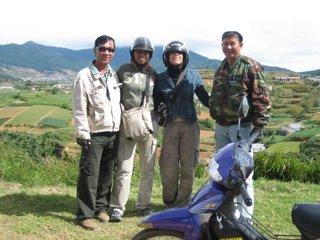 still manage to flow up my sleeves and down my neck as I cruise around on the back of Lulu’s Honda. Indifferent however, I’m smiling from ear to ear as I gulp the pure, unpolluted air and take in the stunning scenery. It certainly cannot be described as untouched in the Laos sense, as rampant agriculture has stamped its mark on every inch of the land. With its cool and equally sunny and rainy climate, the rich soil here is serves as a vegetable patch for the whole country.
still manage to flow up my sleeves and down my neck as I cruise around on the back of Lulu’s Honda. Indifferent however, I’m smiling from ear to ear as I gulp the pure, unpolluted air and take in the stunning scenery. It certainly cannot be described as untouched in the Laos sense, as rampant agriculture has stamped its mark on every inch of the land. With its cool and equally sunny and rainy climate, the rich soil here is serves as a vegetable patch for the whole country.Our two guides, Lulu and Phuk take us around numerous farms growing a vast range of flowers, vegetables, fruit, and this areas most lucrative product, coffee. Oh Vietnamese coffee...how I miss the super strong shots of espresso served dripping through tiny aluminium percolators resting precariously on top of a glass and sweetened with a huge dollop of condensed milk. In a similar way to the Italians, coffee culture is ingrained in (predominantly male) Vietnamese life and tiny cafes, often no more then rickety wooden shacks with plastic tables and child sized stools can be found on every street corner.

One of the most interesting places we visit that day is the silk factory where we see the fascinating transformation of a worm into an intricately patterned silk scarf! Inside the deafening, primitive factory women’s hands move at such speed and skill they are a blur.
Meeting the Ma children

‘We come to a stop somewhere in the central highlands and pay a visit on the Ma people. No sooner do we climb off the motorbikes and we are surrounded by children. Grubby little faces smile at us and hands appear from everywhere eagerly anticipating the coconut sweets that they know Lulu is going to produce. As the sweets come out, there is chaotic pushing and shoving until everyone receives their share. We are invited into a wooded shack to drink tea with some of the older members of the community who mind the children while the parents work in the coffee plantations.
‘We are interested to know why, in a country with a two child policy, there are so many kids in this tiny hamlet. Lulu tells us that the government were also concerned with this, so in came the doctors and out came the condoms. Six months after the condoms were distributed, the doctors came back to check the progress and much to their dismay more women were pregnant. It seems that after a night’s consumption of the potent local brew, condoms are the last things on
 these gentlemen’s minds! I think that the government’s strategy needs tweaking slightly!
these gentlemen’s minds! I think that the government’s strategy needs tweaking slightly!‘The Ma children do not go to school. Keen to maintain a strong sense of tradition in this minority village, the families reject the governments attempts to assimilate them into mainstream Vietnamese society which includes education. They speak their own language and don’t understand Vietnamese, but of course all the children can say “Hello” and “bye, bye” in perfect English!'
Thursday, March 16, 2006
Village life
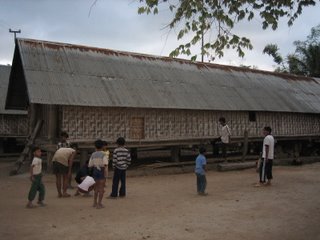
‘As the sun begins to set we hit the Dak Lac province and notice more civilisation as we speed through a fairly large town. We are staying in the outskirts of the town amongst the M’Nong minority people. Most of the buildings in the village are built out of bamboo in the traditional longhouse style.
We eat in the house of the village chief (we are dubious about this fact but anyway…). He is 87 and his wife who must sit behind the men out of the circle is 92.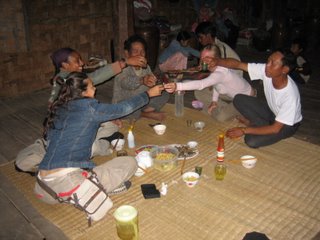
After a delicious dinner of succulent pork and noodles the rice wine is flowing.
For every new glass we down we
have to clink glasses and shout “yo!”. Much to our dismay, after 3 or 4 glasses this homemade brew becomes no less
Day 2
‘5am and we are rudely awoken by farmyard sounds. The rooster’s actually sound like they are in my bed and as the screeching pig predicts its imminent slaughter, I suddenly begin to feel guilty about the succulent pork I tucked into last night.’
The people of this village get up at around 4am and head down to the lake to start fishing. At around 8am they go straight out to the fields where they will undertake backbreaking manual labour until dusk. The advertisement billboards in this area do not bombard us with familiar brand images of trans national corporations, rather they are an array of often quite amusing communist propaganda illustrations. Lulu tells me that many of the ones in this village are encouraging workers to work harder to increase productivity thus improve their living standards and the overall nation’s economy. What continues to baffle me is that for people who work the hours I have mentioned above, is it possible to work any harder? Having seen the ways these people live, they work harder then anyone I have ever met, yet they have absolutely nothing in terms of m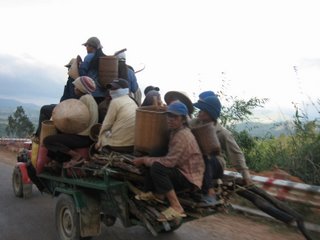 aterial wealth. They like in bamboo shacks dress in tattered old clothes and eat whatever livestock they maintain or food grown locally.
aterial wealth. They like in bamboo shacks dress in tattered old clothes and eat whatever livestock they maintain or food grown locally.
A taxi home from the fields, rural Vietnam style!
Tuesday, March 14, 2006
Lost in the jungle!
After a morning in the saddle sightseeing and learning about the Vietnam War, it was time for a little trek in the jungle.
Diary entry:
‘Lulu escorts us to a waterfall and shows us the path to follow which will take us to the second waterfall where he and Phuk will be waiting to pick us up. Our only instructions are:
“Turn left at the first turn ing”
ing”
Fantastic, couldn’t be easier. So off we trot, happy to be relieving our saddle bum in the stunning lush jungle. It’s 3.30pm and the gently lowering sun shines brightly through the gaps in the trees. We take the first left turning only to be confronted by an angry barking dog protecting the house that we are about to walk in to.
“Ok, that was a small path; it must be the next left turning.”
So we continue along the brick red path that has already covered our shoes and trousers with its potent dust.
“Ah, ha! Another left turning”
This time we come across fields filled with small shrubs dripping with thousands of red, orange and green chilli peppers. They look so beautiful. We come across a group of local farmers who are busy munching on great big slices of crunchy semi-ripe papaya that they have just picked from a tree. They look momentarily taken aback at the sight of 3 western girls roaming around this remote backcountry alone, but smile generously and offer us some of their snack. As we stand around noisily chomping on the fruit dipped into an interesting concoction of salt, sugar and chilly, they confirm our suspicions through exaggerated hand signals that we are 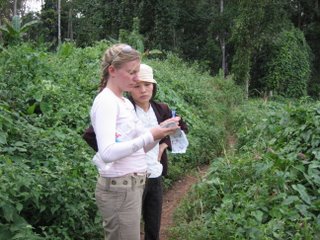 going the wrong way. We say our goodbyes and in another direction.
going the wrong way. We say our goodbyes and in another direction.
Getting directions from the papaya lady.
Suddenly, one of the papaya ladies comes running after us pointing at the sun and waving her arms around like a mad women. We think she is telling us that the route we are taking will take us 2 hours as she points nervously at the rapidly setting sun. It takes us about 20 minutes to convey to her that we have to go this way because our guides are meeting us at the second waterfall. She is adamant however, that we will not make it and walks us right back to where Lulu left us and points us down a completely different path that she assures us will take us to the second waterfall.
In spite of our anxiety about whether we are heading to the right place due to the complete language barrier, we trust the kind lady. We are now stomping down the meandering path, heading deeper and deeper into the jungle to the chorus of screeching mosquito’s.
“Shit, we are in the jungle at dusk near the Cambodian border, was this a spot marked red on my malaria map?”
I quit my malaria pills 2 weeks ago!
We have no water, no food, no DEET and to tourch talk about travelling prepared! An hour later just as the light fades dangerously fast, we finally hit a road. Never have I been so happy to see beautiful tarmac! All my visions of bedding down on the jungle carpet being eaten alive by mosquitoes and snakes instantly evaporate. As we march down the road we are greeted by the roaring sounds of thousands of litres of gushing water. This has got to be the waterfall, and sure enough as we come around the corner we are greeted by the sight of a phenomenal mini Niagara falls type waterfall. But we are not interested in sightseeing no matter how impressive this particular point of interest might be, and our elation at the thought of being saved quickly gives way to a sinking feeling as we realise the place is deserted, no motorbikes, no guides.
We see a road at the other side of the waterfall. Has this different path led us to the wrong side? Unable to see any way of crossing this vast expanse of water, we resume our march back up the road. Then comes the true highlight of my day, as we are dazzled by bright lights and the sounds of friendly beeping horns, yes our chariot awaits. Phuk and Lulu had gone back to the start of the walk thinking we had been scared off by the animals in the jungle and aborted our mission. How dare they undermine our adventurous spirit! Only then do they tell us that all the dangerous snakes come out to play at dusk.
life at the roadside....
Day 3
A carnivores delight
Diary entries:
‘Lunch in a restaurant in rural Central Highlands proved to be interesting to say the least. As we take our seat on the plastic chairs, Phuk brings over a huge jar filled with a large rodent type animal pickled in rice wine. This is not lunch…thank god, it’s traditional Vietnamese medicine. As I take a look at the back of the restaurant, I find a whole array of funky pickling jars filled with various reptiles and rodents. As decorative stuffed animal heads stare down at me from the walls, my appetite takes a dive bomb even before any mention of food. Much to my delight a feast of “miscellaneous meet” is placed before us. Dishes loaded with pigs tongue, blood sausage and bitter melon stuffed god knows what kind of minced meat just wait to be demolished. My appetite has now plummeted through the concrete floor of the restaurant as I push grains of plain white rice around my bowl with my chop sticks. I guess I can blame it on my vegetarian upbringing. ‘
The day certainly improved as we cruised at mac 10 on one of the most stunning roads I have ever travelled. I spent the rest of the day wearing this huge grin as the speed of the bike and the breathtaking scenery sent my adrenaline pumping. Although this road is paved and in relatively new condition, it is generally only used for locals to move between the various villages on their ancient scooters, so for the majority of the time we have to ourselves. We cruise by huge lakes and pass through countless minority villages.
At one point we 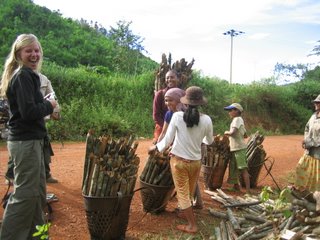 stop to chat to a group of peasant women and children collecting firewood at the side of the road. Their baskets are bursting full of heavy wood and Jasmine, by far the most athletic one the three of us, decides to have a go and has to be helped off the floor by two of the women. She gets totally shown up as a girl that looks about nine years old effortlessly lifts the load and begins the long walk back to the village.
stop to chat to a group of peasant women and children collecting firewood at the side of the road. Their baskets are bursting full of heavy wood and Jasmine, by far the most athletic one the three of us, decides to have a go and has to be helped off the floor by two of the women. She gets totally shown up as a girl that looks about nine years old effortlessly lifts the load and begins the long walk back to the village.
My first out of space experience
‘After a long time in the saddle we take a break in a small town and stop to try the dumplings that are being sold by the side of the road. As we are munching away I notice that slowly but surely more and more people are coming out of their houses to congregate at the roadside and stare intently at us. O.k, let me set the scene a minute:
Rural Vietnam, miles away from any tourist town, on a road that is barely used, and along come trhee beings from outer space.
Alien 1: Long blonde hair and red wind burnt face.
Alien 2: Long curly hair, huge brown eyes.
Alien 3: African/Indian American
We smile and wave…no response, just long hard stares, months slightly open. I fear that we are now scaring the children. To my surprise Julia and Jasmine are still tucking into their dumpling totally un-phased.
“What? This happens everywhere you go in China”
They have just spent 5 weeks as aliens on China.
Back to reality...
As we hit the tourist area of town, which in the usual Vietnamese fashion is totally segregated from where the local's live, we are immediatly once again surrounded by a sea of white faces. In for days on the road in the hills we have not seen one other white face, as true to their promise, the easyriders took us well off the beaten track. We are now however in the land of over-priced restaurants with English menu's and cocktail bars run by ozzie surfers.
I can honestly say that had we not taken the easyrider tour I would have left Vietnam ignorent and a little bitter. We saw things that we would never have realised existed, and gained an insight into this diverse and amazing nation that unfortunatly most people miss on the seven stop bus ticket. Being a tourist in Vietnam is frustrating and for so many people I have met on my travels can be a negative experience. However, the insights we gained in these four days totally made up for the frustrations we had previously experienced. I will forever remember this country for its ability to suprise, amaze, shock, amuse and inspire me.
